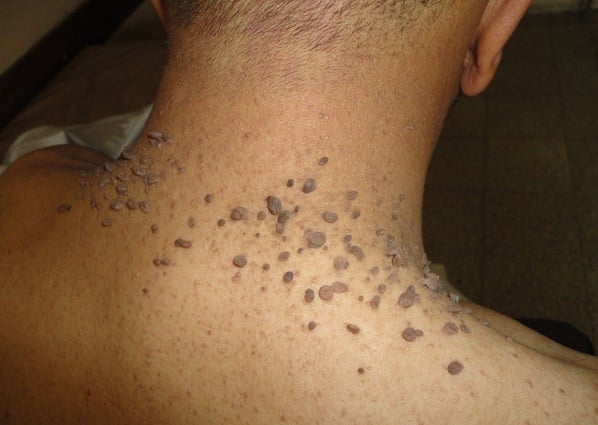There are measures on how to prevent skin tags. Though skin tags are harmless, that doesn’t mean people want them on their skin. Skin tags are not a rare sight. Twenty-five per cent of people have at least one skin tag.
If you want to check your body for skin tags, they most likely grow in places where there are folds of skin including around the genitals, under the armpits, neck, and under the breasts. One of the rare places where you can find a skin tag is on the eyelids. For these kinds of skin tags that are located in sensitive areas, if you wish to remove them you should see your doctor for a safer procedure.
What is a skin tag?
Have you ever noticed a small bag-like skin connected to your body by a slender stalk? Something that looks like a raised bit of skin, typically present in places where your clothes rub against your skin, or places on the body where skin rubs against the skin? Yep. That’s a skin tag right there.
Studies have shown that skin tags can run in the family. Medically, a skin tag is known as acrochordon. Other terms such as soft fibromas, fibroma pendulans, and pedunculated fibroma are used sometimes.
How to prevent skin tags
Take the following measures if you want to avoid getting skin tags.
1. Minimize skin to skin rubbing
While it is not certain what exactly causes skin tags, you might want to minimize skin to skin rubbing or your clothes rubbing against your skin. Wear clothes that are clean and are soft against the skin, because they can help cushion areas where there’s skin to skin rubbing. However, there’s not a lot you can do for places like outside your eyelids. There you can’t minimize friction.
2. Reduce skin fold
The only way to reduce skin folds is to lose some weight. You are more likely to have skin tags if you’re overweight. As previously stated, skin tags are mostly found in areas of the body where there are folds. This is because there’s more of skin to skin rubbing in those places. So if you’re worried about skin tags, try and lose weight. There are a variety of ways to lose weight. But if you’re not sure which should work for you, talk to your doctor.
3. Prevent diabetes
Due to the amount of insulin in their blood, people living with diabetes have a higher chance of having skin tags. Do what you can to prevent diabetes if you don’t want to get skin tags. If you have been informed that you’re pre-diabetic, adopt the healthy lifestyle the doctor has recommended. And do lots of exercises.
Home remedies for skin tag removal
Before you try the following skin tag removal at home, please check with your doctor.
1. Freezing kit
You can often acquire freezing kits from drugstores near you. The product contains liquid nitrogen that you can use to freeze skin tags. The spray is not good for the surrounding skin, so you might want to apply petroleum jelly to those areas before applying. And skin tag may not fall away after one or two applications. It takes several for it to finally take effect. Usually, that happens within ten days.
2. Tea tree oil
Though this is used for a lot of skin conditions, according to anecdotal evidence, tea tree oil can also be used to treat skin tags too. Whether this is effective is debatable. This is used by applying a few drops to a cotton ball and sticking it to the skin tag with a bandage. Check with your doctor before using this, as tea tree oil may irritate your skin if it is sensitive.
3. Apple cider vinegar
Research has been carried out on how effective apple cider vinegar is for skin tag removal. To apply, soak a cotton ball in vinegar and place on the skin tag. Hold it in place with a bandage for ten minutes. Do it thrice a day for the skin tag to fall off. Please, discontinue if there’s skin irritation.
4. Iodine
You can use iodine to remove skin tags if you’re to believe anecdotal evidence. Protect the surrounding area with petroleum jelly before applying iodine. Use Q-tips to apply. Q-tips are those short sticks that have cotton at both ends.
Conclusion
If the skin tag is located around the eyes or genitals, do not try to remove with home remedies. These areas are sensitive. Therefore see your doctor. Also, discontinue any home remedies if there’s intense pain, irritation, or bleeding.
This article was first published on AfricaParent.com
Copyright 2025 TheCable. All rights reserved. This material, and other digital content on this website, may not be reproduced, published, broadcast, rewritten or redistributed in whole or in part without prior express written permission from TheCable.
Follow us on twitter @Thecablestyle

